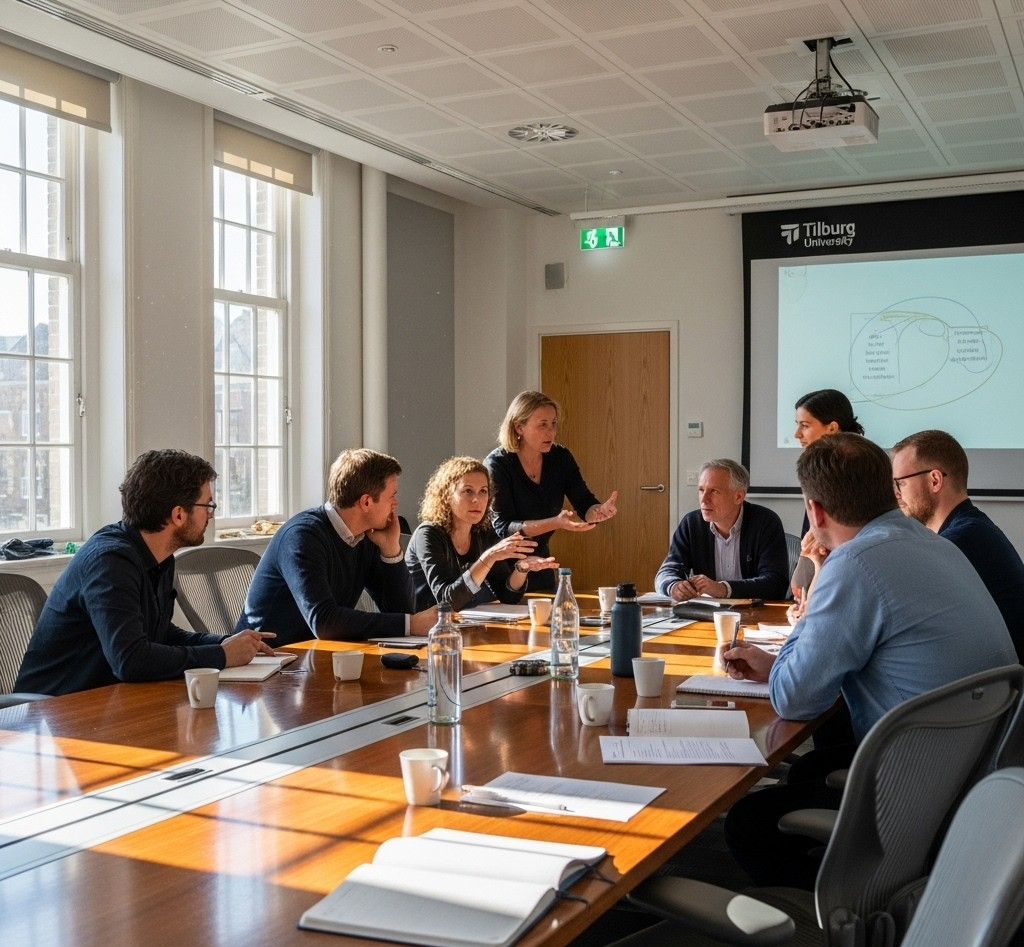The Tilburg Witteveen Memorial Fellowship 2026 represents a unique and prestigious opportunity for scholars dedicated to the rich intersection of law and the humanities. If you’re an ambitious researcher looking to immerse yourself in a vibrant academic environment, this guide is your first step. Pursuing a fellowship can feel like navigating a complex maze, but I’m here to provide you with a clear, encouraging roadmap to help you craft an application that truly stands out. Let’s break down everything you need to know to turn this ambition into a reality.

Tilburg Witteveen Memorial Fellowship 2026
| Key Fact | Details |
| Host Institution | Tilburg University, Tilburg Law School, The Netherlands |
| Field of Study | Interdisciplinary research in Law and Humanities |
| Target Audience | PhD holders (early to mid-career scholars) from all nationalities |
| Typical Duration | 3 Months |
| Funding | Fully funded, including a stipend, travel costs, and workspace, Tilburg University scholarship website. |
Applying for the Tilburg Witteveen Memorial Fellowship 2026 is a significant step, but it’s an achievable goal for the right scholar. It’s an invitation to dedicate three months to your intellectual passion, surrounded by a supportive and stimulating community, all while honoring the memory of a remarkable academic. By focusing on the unique spirit of the fellowship and carefully crafting your application, you can present a compelling case for why you should be the next Witteveen Fellow.
What is the Tilburg Witteveen Memorial Fellowship?
The Witteveen Memorial Fellowship is more than just a research grant; it’s a living tribute to the legacy of Professor Willem Witteveen. He was a distinguished legal scholar at Tilburg University, renowned for his work in legal theory, rhetoric, and the connections between law and literature. Tragically, he, his wife, and his daughter were passengers on Malaysia Airlines Flight 17, which was shot down over Ukraine in 2014.
Established in his honor, the fellowship invites scholars to Tilburg Law School to conduct research that reflects Professor Witteveen’s intellectual spirit. It champions innovative, interdisciplinary work that explores law through the lens of the humanities—think philosophy, history, literature, and political science. This is a chance to contribute to a field that values deep thinking, critical inquiry, and the humanistic dimensions of law.

Are You the Ideal Candidate? Understanding the Eligibility Criteria
Before diving into the application, it’s crucial to see if the fellowship aligns with your profile. The selection committee seeks a specific blend of academic achievement and intellectual curiosity.
Academic and Professional Background
The fellowship is primarily aimed at scholars who have already completed their PhD. It’s a perfect fit for early to mid-career academics, including postdoctoral researchers and assistant or associate professors, who are looking for a dedicated period of research to advance a project.
Research Focus
This is the most critical element. Your proposed research must have a clear and compelling connection to the themes that defined Professor Witteveen’s work. A project solely focused on a narrow, technical aspect of law is unlikely to succeed. Your proposal must demonstrate a genuine engagement with law and humanities. This could involve:
- The rhetoric of legal language.
- The role of narrative in judicial decisions.
- Philosophical underpinnings of legal principles.
- The historical evolution of legal concepts.
In my experience advising students on such applications, fellowships like this aren’t just looking for a strong CV; they’re searching for a scholar whose vision resonates deeply with the fellowship’s spirit.
International Reach
One of the best aspects of this program is its global perspective. The Tilburg Witteveen Memorial Fellowship is open to qualified applicants of all nationalities. The working language is English, so proficiency in Dutch is not a requirement.
What the Fellowship Offers: A Comprehensive Benefits Package
Being a Witteveen Fellow means you are fully supported, allowing you to focus entirely on your research and academic immersion. While specific amounts can vary by year, the benefits package is designed to be comprehensive.
- Generous Stipend: Fellows receive a monthly stipend to cover living expenses during their stay in Tilburg.
- Travel Reimbursement: The costs of travel to and from the Netherlands are typically covered.
- Dedicated Workspace: You’ll be provided with an office at the Tilburg Law School, giving you a base for your work and encouraging interaction with the faculty.
- Full University Access: This includes access to Tilburg University’s world-class libraries, extensive online databases, and other research facilities.
- An Engaging Academic Community: The fellowship provides invaluable opportunities to present your work, collaborate with Tilburg faculty, and participate in seminars and workshops.
How to Apply for the Tilburg Witteveen Memorial Fellowship 2026: A Step-by-Step Guide
A successful application is built on careful preparation and attention to detail. Follow these steps to put your best foot forward.
Step 1: Crafting Your Research Proposal
Your research proposal is the heart of your application. It should be clear, concise (usually around 5 pages), and compelling. It needs to articulate not just what you’ll research, but why it matters and how it connects to the law and humanities tradition.
Be sure to include:
- A sharp, well-defined research question.
- A brief review of the relevant literature to position your work.
- Your proposed methodology or theoretical approach.
- The expected outcomes and contribution of your research.
- A clear statement on how your project aligns with the legacy of Willem Witteveen.
Step 2: Preparing Your Essential Documents
Start gathering your documents well in advance. A typical application package for this fully funded fellowship in the Netherlands includes:
- A Detailed Curriculum Vitae (CV): Highlight your publications, presentations, and any research that demonstrates your interdisciplinary skills. I’ve seen many successful applicants make the mistake of using a generic CV; for this fellowship, tailor it to highlight your interdisciplinary work in law and the humanities.
- A Cover Letter: This is your chance to make a personal case. Explain your motivation for applying, why you are a good fit for the fellowship, and why Tilburg University is the right place for you to conduct this research.
- The Research Proposal: As detailed above.
- One or Two Letters of Recommendation: Choose referees who know you and your research well and can speak to your ability to work independently and contribute to an academic community.
Step 3: Navigating the Application Timeline
Fellowship deadlines are absolute. According to information from previous cycles on the Tilburg University scholarship website, the call for applications for a fall fellowship typically opens in the preceding winter, with a deadline in early spring. For the 2026 fellowship, you should start checking the official website in late 2025 for the exact dates.
Tips for a Standout Application
Beyond ticking the boxes, how do you make your application memorable?
- Connect with the Legacy: Take the time to read some of Professor Witteveen’s work. Understanding his intellectual contributions and subtly referencing them in your proposal shows a deep and genuine interest that will set you apart.
- Highlight Collaboration: Express your interest in collaborating with specific scholars at Tilburg Law School. Mentioning a professor whose work aligns with yours demonstrates that you’ve done your homework and are serious about engaging with the community.
- Proofread Everything: It may sound basic, but typos and grammatical errors can give the impression of carelessness. Have a trusted colleague or mentor review your entire application before you submit it.

Your Definitive Guide to the Loeb Classical Library Foundation Fellowships 2026
A Game-Changer for Your Career: Commonwealth Professional Fellowships 2026 Application Process
FAQs
Q1:Is the Tilburg Witteveen Memorial Fellowship open to scholars from my country?
Yes, absolutely. The fellowship is open to applicants of all nationalities. The main criteria are academic merit and the relevance of the proposed research.
Q2:Do I need to have a PhD to apply for the fellowship?
Yes, the fellowship is intended for postdoctoral scholars. Applicants are generally expected to have obtained their PhD by the time the fellowship would begin.
Q3:What is the duration of the fellowship?
The fellowship is typically for a period of three months, usually scheduled during the fall semester (September-December).
Q4:Is knowledge of the Dutch language required?
No, it is not. The working language of the fellowship and Tilburg Law School’s research community is English.










